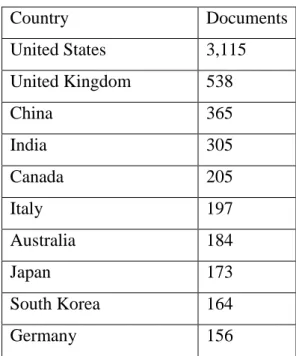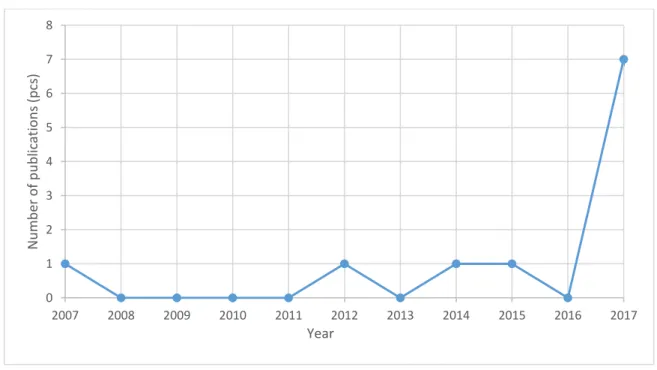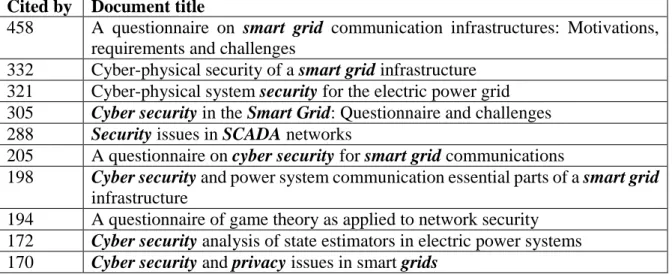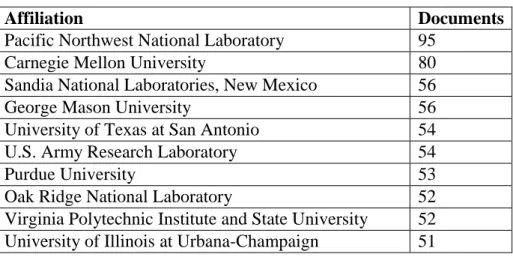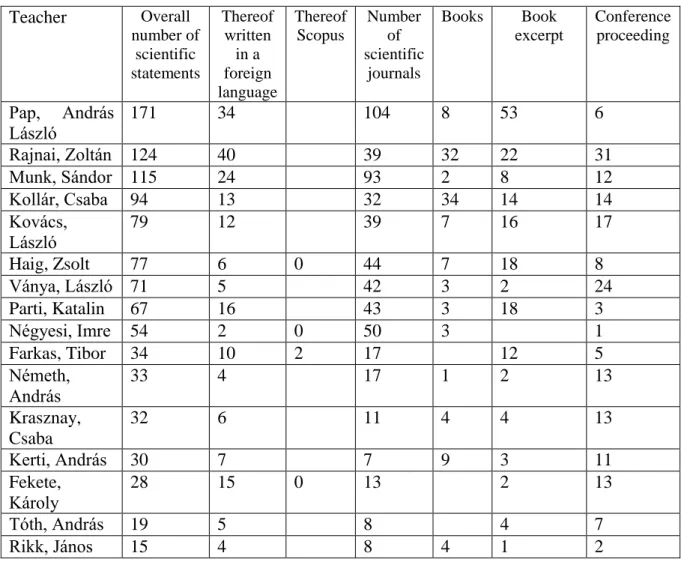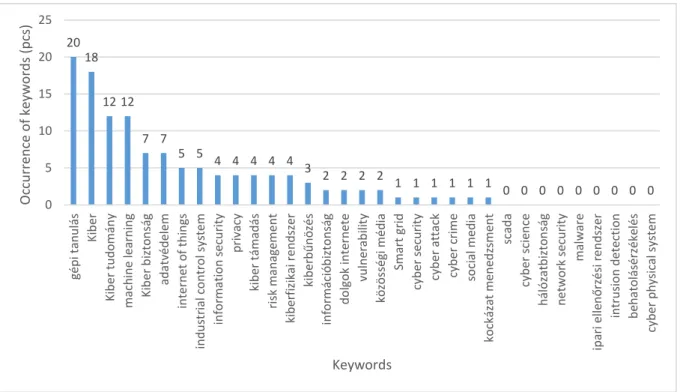THE EMERGENCE OF CYBER SECURITY IN THE SCIENTIFIC COMMUNITY
A KIBERBIZTONSÁG MEGJELENÉSE A TUDOMÁNYOS KÖZÉLETBEN
Péter BÁNYÁSZ
(ORCID: 0000-0002-7308-9304) banyasz,peter@uni-nke.hu
Abstract
Providing an appropriate level of cyber security is essential for individuals, organizations and states. The increase of info-communication technologies further enhances our dependence on cyberspace. This study examines the occurrence of cyber security in scientific publications in order to motivate coverage of other researches related to the Hungarian topic in a broader spectrum in the field of doctoral studies.
Supported by the ÚNKP-17-3-IV-NKE-59 New National Excellence Program of the Ministry of Human Capacities.
Keywords: cyber security, scientific metrics, research, publications, doctoral training
Absztrakt
A megfelelő szintű kiberbiztonság megteremtése elengedhetetlen az egyének, szervezetek és államok részére egyaránt. Az infokommunikációs technológiák számának növekedése tovább fokozza a kibertértől való függőségünket. A tanulmány a kiberbiztonság tudományos publikációkban való megjelenését vizsgálja annak céljából, hogy ösztönözze a magyarországi témával kapcsolatos kutatások szélesebb spektrumban történő lefedését a doktori képzések területén.
A tanulmány az Emberi Erőforrások Minisztériuma ÚNKP-17-3-IV-NKE-59 Kódszámú Új Nemzeti Kiválóság Programjának Támogatásával készült.
Kulcsszavak: kiberbiztonság,
tudománymetria, kutatás, publikációk, doktori képzés
A kézirat benyújtásának dátuma (Date of the submission): 2018.06.05.
A kézirat elfogadásának dátuma (Date of the acceptance): 2018.06.25.
INTRODUCTION
This study was inspired by researches conducted by Péter Sasvári és Anna Urbanovics, in which they have examined university courses related to cyber security by analyzing scientific metrics [1] [2]. As a lecturer for undergraduate and master’s programme students at the Faculty of Science of Public Governance and Administration of the National University of Public Service I hold several courses on cyber security, where I ask them whether they believe that cyber security is a discipline that belongs to technology or humanities. The majority of respondents usually vote for technology. Our students participate in courses of social sciences, which means that those who typically classify cyber security as the scientific domain of technology often present themselves as persons not understand issues regarding cyber security because of its technical nature. Clearly, my small questionnaires cannot be viewed as representative, but they made me think about the scientific distribution of Hungarian researches on cyber security.
The Hungarian National Cyber Security Strategy established in 2012 defines cyber security as follows: “Cyber security is the continuous and planned taking of political, legal, economic, educational, awareness raising and technical measures to manage risks in cyberspace that transforms the cyberspace in to a reliable environment for the smooth functioning and operation of societal and economic processes by ensuring an acceptable level of risks in cyberspace.” [3] It can be inferred from the definition that Hungarian strategy creators interpret cyber security as a research domain of inter- and multidisciplinary nature. In my research I tried to find answers to how the inter- and multidisciplinary approach of cyber security prevails in the case of scientific statements, and what trends can be observed in researches on cyber security. Within my examinations based on the analysis of global trends, I refer also to the evaluation of publication activities in Hungary, and I’ve also examined doctoral thesis topic proposals of 2018 announced regarding cyber security.
METHODOLOGY
During the course of my analyses I’ve conducted a keyword analysis by using the Scopus database. Scopus, founded in 2004, is the largest abstract and citation database of peer-reviewed literature, which enables the analysis of scientific journals, books and conference proceedings.
I’ve built my database based on the keyword “cyber security” using Scopus. However, this database doesn’t include the scientific domain and discipline classification of scientific statements, but I’ve relied on the database of SCImago Journal Rank (hereinafter SJR) in order to define it. SJR uses numerous indicators to rank scientific journals and conference proceedings based on the assessment of scientific metrics. It is important to note that a scientific journal or a conference proceeding can be relevant in several scientific domains.
The search concerned every scientific statement that included the search term “cyber security” in its title, abstract or keywords. The database, similarly to Google search interprets the connection between words based on several keywords only then, if they are in quotation marks, otherwise every result will be displayed that include the terms “cyber” or “security”.
The search was conducted with this restriction. The results included scientific journals, conference proceedings, books and other forms of publication. I’ve examined the result list according to scientific domain distribution.
In the international scientific community each scientific domain does not cover the same fields as determined in the scientific domain nomenclature by the Hungarian Academy of Sciences. The SJR distinguishes 27 major thematic areas, while the Hungarian Academy of Sciences distinct only 3 scientific domains. In my study I applied the scientific domain approach used by the SJR.
Beside the scientific metrics approach, I’ve also conducted a keyword analysis. Reason for this is the notion that the more frequently a certain keyword occurs the more relevant it can be
viewed as. I’ve conducted a trend analysis based on the occurrence of relevant keywords in order to examine whether a pattern could be determined for the proliferation of single keywords.
Further, I’ve conducted an international examination by limiting the scope to Hungary in order to find out how researches related to Hungarian cyber security are fitting in global trends.
The proposed doctoral thesis topics in 2018 were also analyzed in order to be able to examine to what extent are new doctoral researches related to cyber security appearing in international trends. For this purpose, I’ve examined on one hand the doctoral thesis topic proposals related to cyber security filtered by branch of sciences, and on the other hand I’ve also conducted a keyword analysis in international scientific statements by using the most frequently provided keywords.
THE EMERGENCE OF CYBER SECURITY IN SCIENTIFIC STATEMENTS Up until 2018, to May 2018 included, Scopus found 7,100 results on the search term “cyber security”. Figure no. 1 shows the scientific domain distribution of statements.
1. Figure Distributions of the search terms cyber security globally per scientific domains according to SJR (own editing, source: Scopus, SJR)
As shown in the figure publications of technical nature are dominating researches related to cyber security, 67.4% of all publications can be subject to Computer Science, and 42.4% to the scientific domain of Engineering. Social sciences only occur 15.3% in publications.
Table no. 1 shows the distribution of each publication according to country based on the top 10 countries.
67,4%
42,4%
15,3%
11,6%
9,1%
7,5%
4,2% 3,2%
2,4% 1,8%
9,0%
Computer Science Engineering
Social Science Mathematics
Energy Decision Sciences
Business, Management and Accountin Physics and Astronomy Materials Science Environmental Science Other
Country Documents
United States 3,115
United Kingdom 538
China 365
India 305
Canada 205
Italy 197
Australia 184
Japan 173
South Korea 164
Germany 156
1. Table Top 10 distributions amongst countries on the search term cyber security (own editing, source: Scopus)
The Scopus database only stores 13 scientific statements after narrowing down the scope to Hungary. This distribution is presented in figure no. 2.
2. Figure Distributions of the search terms cyber security in Hungary per scientific domains according to SJR (own editing, source: Scopus, SJR)
83,3%
41,7%
16,7%
16,7%
8,3%
8,3% 8,3%
Computer Science Engineering
Social Science Mathematics
Energy Decision Sciences
Business, Management and Accountin
Proportionally, the classification of scientific domains of Hungarian publications is distributed almost identically. Although the dominance of Computer science is more significant, 83.3% of all publications can be included here, but the proportions are almost identical when we look at Engineering (41.7%) and Social science (16.7%).
Figure no. 3 contains the yearly distribution of each publication. Statements dated back to 2018, which means 6,557 publications are not listed in the figure. It is apparent that the first result for the search term cyber security can be dated back to 1998, and that the number of publications related to this topic has considerably grown from the year 2000.
3. Figure Yearly distributions of the number of publications globally based on the search term cyber security (own editing, source: Scopus)
The trend of the number of Hungarian publications is represented in figure no. 4. In this case I’ve omitted publications from 2018, thus 11 scientific statements can be seen in the figure.
4. Figure Yearly distribution of the number of publications in Hungary based on the search term cyber security (own editing, source: Scopus)
1462 1185 926 624 685
458 357 171 255
97 109 60 85
25 34 6 12
1 1 1 0 200 400 600 800 1000 1200 1400 1600
19981999200020012002200320042005200620072008200920102011201220132014201520162017
Number of publications (pcs)
Year
0 1 2 3 4 5 6 7 8
2007 2008 2009 2010 2011 2012 2013 2014 2015 2016 2017
Number of publications (pcs)
Year
The first publication on the topic in Hungary has been published in 2007, but more than 60%
of all statements have been published in 2017.
The publications include overall 14,137 keywords, which needed to be narrowed down in order the manage them in a consistent manner. This was justified by the use of the singular and plural form of each keyword, by their different spelling,1 and typos. In figure no. 5 I’ve displayed those search terms where the result rate was over 100.
5. Figure Occurrence of keywords globally for results on the search term security between 2001 and 2017 (own editing, source: Scopus)
The trends in the figure are interesting because the occurrence of search terms by years could explain why certain topics have peaked. The keyword privacy illustrates the validity of the finding, which occurred only in a few publications until 2013, but the number of occurrences has increased from 2014. Presumably, this can be due to the surveillance revelation regarding Edward Snowden, which can be dated back to 2013.
1 For example cyber security, cybersecurity, Cyber security, Cyber Security, Cybersecurity 200
1 200
2 200
3 200
4 200
5 200
6 200
7 200
8 200
9 201
0 201
1 201
2 201
3 201
4 201
5 201
6 201
7 Öss zes en cyber security 1 0 3 1 6 13 6 15 10 51 60 104 162 169 252 143 393 1389
security 0 0 1 1 1 0 3 3 7 7 16 13 17 25 41 42 59 236
smart grid 0 0 0 0 0 0 0 0 0 14 31 18 23 19 25 37 41 208
cyber sciences 0 0 0 0 0 0 0 0 0 0 0 0 0 0 0 174 1 175
scada 0 0 0 0 1 3 2 9 2 5 15 22 10 20 18 26 24 157
information security 0 0 0 0 0 1 1 1 1 10 1 12 14 13 18 23 20 115
privacy 0 0 0 0 0 1 0 0 0 1 6 3 5 12 33 25 37 123
internet of things 0 0 0 0 0 0 0 0 0 0 0 0 3 1 14 30 64 112
0 200 400 600 800 1000 1200 1400 1600
Number of search terms (pcs)
Keyword
As is well known, Edward Snowden as the former employee of the National Security Agency has exposed the surveillance process related to the National Security Agency and its partner services, which has fundamentally changed our mindset regarding privacy [4].
The search terms smart grid and scada occur primarily in technical researches, but not only the occurrence of the keywords refers to the dominance of the topic. By examining the citations of all publications, we can conclude that 8 publications of the 10 most cited scientific statements are included (see table no. 2). The keywords indicated in table no. 5 are highlighted by being written in bold and italic style.
Cited by Document title
458 A questionnaire on smart grid communication infrastructures: Motivations, requirements and challenges
332 Cyber-physical security of a smart grid infrastructure 321 Cyber-physical system security for the electric power grid 305 Cyber security in the Smart Grid: Questionnaire and challenges 288 Security issues in SCADA networks
205 A questionnaire on cyber security for smart grid communications
198 Cyber security and power system communication essential parts of a smart grid infrastructure
194 A questionnaire of game theory as applied to network security 172 Cyber security analysis of state estimators in electric power systems 170 Cyber security and privacy issues in smart grids
2. Table The most cited scientific statements globally for results on the search term security (own editing, source: Scopus)
In the case of keywords in Hungarian publications 42 keywords occurred when examining 13 statements. These are included in table no. 3.
Keyword Occurrence
cyber security 3
networked production 2
behavioral analytics 1
blockchains 1
cloud computing 1
computer supported collaborative work 1
cryptographic protocols 1
cyber-physical systems 1
cyber security 1
cyber security education 1
cybersecurity training 1
data protection 1
decision making under uncertainty 1
eHealth 1
factory of the future 1
fictitious play 1
gdpr 1
human factors 1
ict 1
identity management 1
information flow 1
information security issues related to information retaining principle security of the virtual world's cyber security
1
internet 1
inter-organizational trust 1
intrusion defense 1
medical devices 1
network organization 1
new security culture 1
profiling 1
resilience 1
robot operating system 1
ros 1.x 1
security 1
security operations center 1
small and medium enterprises (smes) 1
smart grid 1
smart meters 1
teamwork 1
vulnerability 1
3. Table Occurrence of keywords in Hungarian scientific statements for results on the search term security (own editing, source: Scopus)
Analyzed globally the top 10 institutions are listed in table no. 4.
Affiliation Documents
Pacific Northwest National Laboratory 95
Carnegie Mellon University 80
Sandia National Laboratories, New Mexico 56
George Mason University 56
University of Texas at San Antonio 54
U.S. Army Research Laboratory 54
Purdue University 53
Oak Ridge National Laboratory 52
Virginia Polytechnic Institute and State University 52 University of Illinois at Urbana-Champaign 51
4. Table Top 10 distributions amongst institutions globally of publications on the search term cyber security (own editing, source: Scopus)
In Hungary 24 institutions can be determined based on authors, institutions with more than one document are listed in table no. 5.
Affiliation Documents
Budapest University of Technology and Economics 2
Computer and Automation Research Institute Hungarian Academy of Sciences
2
Hungarian Academy of Sciences 2
Interuniversity Micro-Electronics Center at Leuven 2
KU Leuven 2
National University of Public Services 2
Óbuda University 2
5. Table Distributions of publications amongst institutions in Hungary based on the search term cyber security (own editing, source: Scopus)
The top 10 list of most publishing authors globally are included in table no. 6, the list of authors with more than one publication in Hungary are represented in table no. 7.
Author Documents
Wang, L. 25
Ekstedt, M. 23
Kozik, R. 22
Sheldon, F.T. 22
Choraś, M. 21
Govindarasu, M. 21
Liu, C.C. 21
Weiss, J. 19
Ishii, H. 18
Zhang, Y. 18
6. Table Top 10 author’s list globally for results on the search term security (own editing, source: Scopus)
Author Documents
Joosen, W. 2
Krasznay, Cs 2
Preuveneers, D. 2
7. Table Authors with more than one statement in Hungary based on the search term cyber security (own editing, source: Scopus)
CYBER SECURITY IN DOCTORAL PROGRAMMES IN HUNGARY
Based on Act CCIV of 2011 On National Higher Education the Hungarian Doctoral Council [5] is considered to be a legal person, and is a body comprising the chairs of the doctoral councils of higher education institutions, tasked with formulating positions on questions related to doctoral programmes and the award of doctoral degrees and laying down, in consultation with the Association of Hungarian PhD and DLA Students, the principles governing the organization of the comprehensive examinations. The Hungarian Doctoral Council shall define the principles of a quality and performance-based distribution among higher education institutions of doctoral students admitted for programmes funded through full or partial Hungarian state scholarships. The proceeding is determined by the Hungarian Government Decree no. 387/2012 (XII. 19.) Concerning Doctoral Schools, the Order of Doctoral Procedures and Habilitation [6] and the Decision no. 2013/6/III/1 by the Hungarian Accreditation Committee [7]. According to the latter doctoral advising is a professional and human responsibility and activity in helping the doctoral candidate. Experts may receive/commit such acknowledgement/task based on the decision of the Council of the Doctoral School. Only a person holding a doctoral degree may become a doctoral advisor, further, it is desirable that the assignment/commission doesn’t take place right after attaining the degree, and it should be based on independent documented successful research work and publication activity. The announced topics by the doctoral advisor have to be approved by the Council of the Doctoral School. The topics have to be proposed, announced and displayed at the Doctoral School and the following website www.doktori.hu. At www.doktori.hu we can filter our search by doctoral schools, lecturers and proposed topics. In case of the latter there is opportunity to filter by branch of science and research topic. These two filters were used in my research.
I’ve examined proposed doctoral topics related to cyber security in 2018 that were announced in the following branches of sciences: military engineering within the technical scientific domain, military science, administration science and police studies within social sciences. Based on that we can identify 36 doctoral topics, which are distributed by doctoral schools and are included in the figure.
6. Figure Proposed doctoral thesis topics according to branch of sciences in 2018 (own editing, source: Doktori.hu)
The proposed thesis topics of the Doctoral School of Military Science and the Doctoral School of Police Studies at the National University of Public Service are basically related to social sciences, while proposed thesis topics of the Doctoral School of Military Engineering at the National University of Public Service and the Doctoral School of Security Science at the Óbuda University are related to engineering sciences. Based on this we can assume that the distribution between scientific domains within technical and social sciences is almost identical, rate of 17-19, but the doctoral thesis topics by each doctoral advisor and the announcements reflect essentially a technical approach.
This is underpinned by the fact that 36 proposed doctoral thesis topics are distributed between 16 doctoral advisors, of whom six2 have announced thesis topics also in the Doctoral School of Military Science and the Doctoral School of Military Engineering (see figure 7 for the distribution by the name of the doctoral advisors). Referring to figure no. 1 and no. 2, where the engineering sciences are overrepresented regarding the scientific domain distribution of scientific statements, I believe that the proposed doctoral thesis topics regarding cyber security are following the same pattern.
2 Farkas, Tibor; Fekete, Károly; Haig, Zsolt; Kollár; Csaba; Négyesi; Imre; Rikk, János 17
16
2 1
Nemzeti Közszolgálati Egyetem Hadtudományi Doktori Iskola Nemzeti Közszolgálati Egyetem Katonai Műszaki Doktori Iskola Nemzeti Közszolgálati Egyetem Rendészettudományi Doktori Iskola Óbudai Egyetem Biztonságtudományi Doktori Iskola
7. Figure Advisors proposing doctoral thesis topics in 2018 on cyber security (own editing, source: Doktori.hu)
Only Csaba Krasznay can be found amongst the advisors proposing doctoral thesis topics on figure no. 7, who published a statement on the search term cyber security subscribed by the Scopus database (see table no. 7).
In addition to the Scopus database I’ve examined the publications of the advisors proposing doctoral thesis topic on figure no. 7 uploaded to the Hungarian National Scientific Bibliography. The Hungarian National Scientific Bibliography is the most important collection and authoritative database of scientific works. Data referring to scientific works and performance of researchers of participating institutions can be uploaded to the database of the National Bibliography of Hungary in a controlled manner. It is the public service obligation of the Hungarian Academy of Sciences to operate the Hungarian National Scientific Bibliography.
It is mandatory for the database of the National Bibliography of Hungary containing scientific statements to display data of scientific works and scientific publications created and published within the context of an employment relationship for the budgetary entities (title, place of first publication, name of the author over which scientific statements the author has rights, and publication), for those the author received support from the budget for the creation of the scientific work [8].
Based on my examination we can consider that 16 doctoral advisors published collectively 1,043 scientific statements, 203 thereof in a foreign language. See detailed distribution of statements below.
8
7
4
4 4
4 4
3 3
2 2
1 1 1 1 1
Farkas, Tibor Négyesi, Imre Fekete, Károly Haig, Zsolt Kovács, László Németh, András Rikk, János Kollár, Csaba Tóth, András Krasznay, Csaba Ványa, László Kerti, András Munk, Sándor Pap, András László Parti, Katalin Rajnai, Zoltán
Teacher Overall number of
scientific statements
Thereof written
in a foreign language
Thereof Scopus
Number of scientific
journals
Books Book excerpt
Conference proceeding
Pap, András László
171 34 104 8 53 6
Rajnai, Zoltán 124 40 39 32 22 31
Munk, Sándor 115 24 93 2 8 12
Kollár, Csaba 94 13 32 34 14 14
Kovács, László
79 12 39 7 16 17
Haig, Zsolt 77 6 0 44 7 18 8
Ványa, László 71 5 42 3 2 24
Parti, Katalin 67 16 43 3 18 3
Négyesi, Imre 54 2 0 50 3 1
Farkas, Tibor 34 10 2 17 12 5
Németh, András
33 4 17 1 2 13
Krasznay, Csaba
32 6 11 4 4 13
Kerti, András 30 7 7 9 3 11
Fekete, Károly
28 15 0 13 2 13
Tóth, András 19 5 8 4 7
Rikk, János 15 4 8 4 1 2
8. Table Distribution of publications by advisors proposing doctoral thesis topics in relation to cyber security (own editing, source: Hungarian National Scientific Bibliography)
As formulated above, in addition to the examination by the branch of sciences I’ve analyzed the proposed doctoral thesis topics also by research topics. Basis for that are the 8 keywords on figure no. 5. In case of the research topics I’ve searched for the English terms and the Hungarian translations thereof. Based on that I’ve identified overall 131 proposed doctoral thesis topics, but it has to be noted that this number doesn’t cover 131 different topics, because based on some keywords there is an overlapping. Th occurrence of the keywords is presented in figure no. 8. Also, those keywords are included in the figure, for which I didn’t get any results, because I think that these are particularly important for the development of the Hungarian doctoral programmes. With regard to the most cited list of statements (see table no. 2), where the terms smart grid and scada were highly overrepresented, figure no. 8 can be interpreted in the following way: the keyword scada gets zero results, the keyword smart grid gets 1 result.
8. Figure Proposed doctoral thesis topics based on keywords in 2018 (own editing, source: Doktori.hu)
In conclusion, the main topics of international scientific publications are represented in the majority of the Hungarian doctoral thesis topic proposals, and according to the trend they are related to engineering sciences in the scientific domain approach. However, researches of technical nature that are related for example to scada systems and smart grid cyber security are underrepresented compared to international researches.
I’ve also examined the doctoral thesis topic proposals related to keywords included in figure no. 8 based on institutions (see figure no. 9). As indicated above, in case of filtering by keywords some doctoral thesis topic proposals are being displayed several times, which explains for example the occurrence of the National University of Public Service in 46 cases, despite the fact that within the three doctoral schools of the National University of Public Service 25 doctoral thesis topics related to cyber security were announced in 2018. It is important to note that filtering by keywords will not only show the results of doctoral thesis topic proposal related to security, but also thesis topic proposals related to the keyword.
Figure no. 9 shows that based on the keywords the substantial part of the doctoral thesis topic proposals in relation to the National University of Public Service, and nearly one third of all thesis topic proposals can be found at this institution.
20 18
12 12 7 7
5 5 4 4 4 4 4 3
2 2 2 2 1 1 1 1 1 1 0 0 0 0 0 0 0 0 0 0
5 10 15 20 25
gépi tanulás Kiber Kiber tudomány machine learning Kiber biztonság adatvédelem internet of things industrial control system information security privacy kiber támadás risk management kiberfizikai rendszer kiberbűnözés információbiztonság dolgok internete vulnerability közösségi média Smart grid cyber security cyber attack cyber crime social media kockázat menedzsment scada cyber science hálózatbiztonság network security malware ipari ellenőrzési rendszer intrusion detection behatolásérzékelés cyber physical system
Occurrence of keywords (pcs)
Keywords
9. Figure Proposed doctoral thesis topics based on keywords per institutions in 2018 (own editing, source: Doktori.hu)
SUMMARY
In my study I’ve examined the occurrence of researches related to cyber security in international and Hungarian scientific publications. It can be concluded based on the scientific metrics analysis of scientific statements related to cyber security stored in the Scopus database that the research domain of cyber security has an inter- and multidisciplinary nature, but engineering sciences are overrepresented.
I’ve examined the most important research topics with a keyword analysis that are related to researches related to cyber security.
Based on international trends I’ve analyzed proposed doctoral research topics in 2018 in order to map to what extent the Hungarian doctoral researches cover the most important international trends. According to this I’ve concluded that the current doctoral thesis topic proposals are in line with international trends and they are dominantly related to engineering sciences, but certain research topics are underrepresented.
REFERENCES
[1] URBANOVICS A.: Az amerikai és brit kiberbiztonsági képzések elemzése tudománymetriai megközelítésből, Intézményi TDK dolgozat, Nemzeti Közszolgálati Egyetem Államtudományi és Közigazgatási Kar, Budapest, 2018. április
[2] URBANOVICS A.- SASVÁRI P.: Az Egyesült Királyságban működő kiberbiztonsági képzések elemzése (workpaper)
[3] Government Decision No. 1139/2013 (III. 21.) on the National Cyber Security Strategy of Hungary, In. Magyar Közlöny, 2013/47.
46
25 22
13 5
3
2 2 2 2 1
Nemzeti Közszolgálati Egyetem Budapesti Műszaki és Gazdasági Egyetem Szegedi Tudományegyetem Miskolci Egyetem
Budapesti Corvinus Egyetem Soproni Egyetem Károli Gáspár Református Egyetem Óbudai Egyetem
Pannon Egyetem Pázmány Péter Katolikus Egyetem Pécsi Tudományegyetem
[4] GREENWALD: GLEN: A Snowden-ügy, HVG Kiadó Zrt., Budapest, 2014.
[5] Act CCIV of 2011 On National Higher Education
[6] Hungarian government decree no. 387/2012 (XII.19.), “Concerning Doctoral Schools, the Order of Doctoral Procedures and Habilitation
[7] Decision no. 2013/6/III/1 by the Hungarian Accreditation Committee [8] Act XL of 1994 on the Hungarian Academy of Sciences

